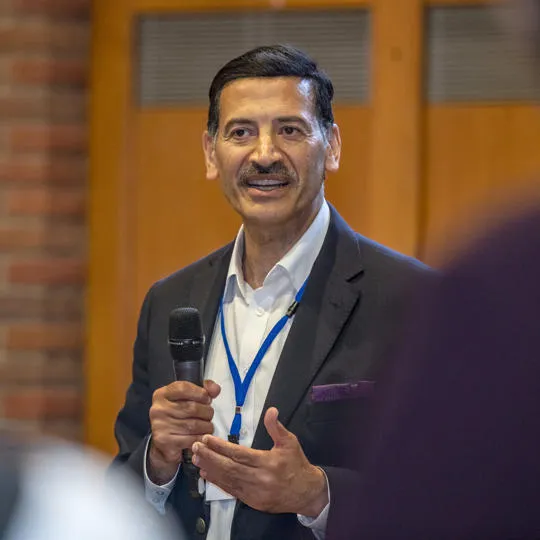13 February 2025
Talking Leadership: Professor Sir Bashir M. Al-Hashimi, Vice President (Research & Innovation)
Professor Sir Bashir M. Al-Hashimi on research and innovation at King's, preparations for REF29, and the importance of building a positive research culture.

Having joined King's in 2020, Professor Sir Bashir M. Al-Hashimi took on the role of Vice President (Research & Innovation) in January 2023. In this video interview, filmed at the London Institute for Healthcare Engineering, Sir Bashir reflects on his first two years in post, his plans for the University's next submission to the Research Excellence Framework, and his priorities for the future.
A full text version of the interview, including additional questions not featured in the video, can be found below.
You took on the role of Vice-President (Research & Innovation) just over two years ago. Can you summarise your role in a few words?
I wish I could summarise it in three words, but I can't! I think it's very, very broad and often means I work very closely with the University Executive to provide decisions and academic leadership for research and innovation at King’s. And that means, in practice, how do we ensure that the quality of our research is of the highest level, as well as delivering impact.
Every day brings a different challenge, but often these challenges lead us to a better place and better research and impact.
What have been the key highlights from your first two years in post?
There are so many examples to choose from. Last summer we established King's Doctoral College, which provides a real focal point for the training and development of our doctoral students.
We have set up two multidisciplinary research institutes: one in Human and Synthetic Minds, and the other in Population Health. And we have established several new senior academic roles that act as champions for areas such as Research Infrastructure, Research Culture, and preparations for the next Research Excellence Framework. Each academic lead works closely with me and a department within the Research Management Innovation Directorate (RMID) to deliver on our research and innovation ambitions.
What is the Research Excellence Framework and why does it matter?
The Research Excellence Framework is a UK system that evaluates the research and impact of UK universities. It provides universities with an independent view and assessment of their research and impact, and helps inform the government's allocation of approx. £2 billion in funding for universities’ research.
It also helps students and academics decide where they study, because there is a link between research and education. Doing well in the REF feeds into attracting quality students, retaining staff and creating a better research environment and culture.
REF provides an excellent opportunity to showcase the research and impact of universities. It is true, it involves a lot of data collection and a lot of writing, and a lot of people to prepare the submissions. But we're not doing anything specifically for the content; it is just a question of collecting the best content and presenting it in the best possible way to tell a story about what research and innovation is about at King's.
King’s has done very well in REF2021, and that gives me confidence that we should be ambitious for REF2029.
Why start preparations for REF29 now?
King’s is a large, research-intensive university and it is likely that we will make 26 discipline submissions to the next REF in 2029. The sooner we start, the more time we have to ensure we present our research and impact in the strongest way possible.
REF is truly a team effort; we have a professional network of experts in RMID who oversee the submissions, and a lot of work is also done in faculties supported by professional services, finance and analytical teams.
How is REF29 different to REF21?
One key change is that outputs from non-academic staff can be returned; for example, outputs from technical staff. And that is a step in the right direction to evidence that inclusive research environments have contributions from many people, and not just academic staff.
Another key change in REF2029 is the emphasis on the role of research culture in which research excellence is delivered.
How do you define a positive research culture?
Research culture is a broad term that represents the values and behaviours of research communities. It influences how research is undertaken, and career development and growth opportunities.
Often research teams have people who have different experiences, different ambitions, which means that to have a positive research culture is to acknowledge, recognise, and provide the right support to people who have different backgrounds and lived experiences.
Very often progress comes as a result of opportunities. I personally benefitted from this. I came here as a young man who spoke very little English, into a new culture. And I was given the opportunity to go to school, to learn the language and to adapt. And that has laid the foundations which have allowed me to progress in life. And at every opportunity, I want to reflect my own experience in what I do to help others.
What advice would you give to a new researcher?
Research is often undertaken under assumptions. Don’t shy away from questioning those assumptions, and don’t underestimate the non-academic impact of your work.
What are your priorities for the future?
My priorities for the future are to continue to improve our research performance, to prepare our REF submissions, to ensure our research is sustainable, to continue to improve our research culture, and to increase the level of innovations that will translate our research into benefits to society, economy, and the planet.
What do you like to do in your spare time?
I like to run. Running gives me an opportunity to be alone with myself. I love my family. I've got three daughters who I enjoy spending a lot of time with, and that's what I do.

